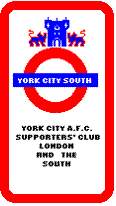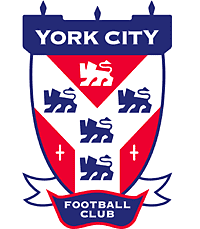

|
YORK CITY SOUTH |
new frontiers (issue 6)
The Most Extraordinary Match I Ever Officiated
Many people have memories of games between those great rivals, Liverpool and Manchester United. Exciting football, the result in doubt until the final whistle. One game played in 1915 is especially well documented in the history of the game. The referee's description of the game lends itself to the title of this piece. The Sporting Chronicle, a rival to The Sporting Life (The What? - Ed 2005) until only a few years ago, described the game as "the most uninteresting game ever seen".
The United secretary / manager left Old Trafford before the Good Friday game had finished (They still do that today - Ed), so disgusted was he with the performance of his team. The result was fixed. Investigations and court cases (Much like today's big games) were to follow. Previously, games had been proved to have been fixed, even more games had been suspected of being fixed but were unproven.
Enoch James "Knocker" Ward, the United inside forward was to be the name most closely associated with the case. His challenge to the football authorities laid open the case to the whole of Britain.
Gambling and promotion / relegation issues had been implicated in previous cases. Now, United were fighting to avoid relegation from Division 1, Liverpool were safe in mid table.
United took an early lead. Then the game took a turn for the worse. Liverpool offered absolutely no threat, booing and a slow hand clap started all around the ground. A penalty was awarded to United. Their regular taker stood back and allowed captain Pat O'Connell to take the kick. It finished nearer the corner flag than the goal. By half time, United lead 2-0. During the interval, the officials discussed their suspicions that the game was being fixed but allowed the second half to start. The Sporting Chronicle described the first half as "too poor to describe" ("Are You Scarborough In Disguise?"). A Liverpool player hit the bar, his team mates told him off. When "Knocker" West got the ball, he regularly kicked it as far out of play as he could manage. United ended 2-0 winners.
A week later, The Sporting Chronicle, printed an advert offering a £50 reward for information regarding a fixed 2-0 result in Manchester at Easter. A firm of bookmakers placed the advert claiming that they had received an unusually large number of bets for United to beat Liverpool 2-0. The Football League appointed a commission to look into the game and allegations. Investigations continued, hampered by the war effort. Players were questioned. In November, nearly all the players involved were again questioned.
On December 23, the commission reported. Some players were found guilty of "squaring" (fixing) the match for monetary gain, some quite considerable amounts of money had been involved. The players had been given the opportunity to tell the truth but, although warned that the Football League were aware of the facts, they refused to do so. 8 players were permanently banned from taking part in football or football management.
The commission suggested that 99 out of 100 games were fair and above board. Their critics leapt on the fact that they were admitting that as many as 1% of all games were fixed.
Far from ending the saga, the outcome only fanned the flames as newspapers printed more allegations and accusations. Knocker Ward in particular felt hard done to. He started a one man campaign to prove his innocence.
In 1917, he took his case to court. His aim being twofold, to claim libel damages and to get his life ban lifted. The law of the land, unlike the FA proceedings were public. In their defence, the FA called, as witnesses, some of the other players that they had banned for life. After 3 days, West's case was thrown out. Several of the witnesses stated that they had indeed been involved in fixing the result. West went back to court in 1919 with an appeal against the previous decision. People who had supported him previously now gave evidence against him. He lost again, this time costs were also awarded against him.
West spent the rest of his working life in the motor industry. Whenever, soccer bribery scandals broke, the newspapers got a quote from him. The quote usually ran along the lines that the players approached to fix the game should immediately report the approach to soccer authorities. Why I wonder hadn't he followed his own advice all those years ago.
After the war, several of the banned players were given the opportunity to apologise for their behaviour and were reinstated by the FA. West never received such an opportunity, probably in view of the fact that he had taken the matter to court.
The early part of the 20th century was littered with cases of suspected result being fixed. Most were unproved but several other leading teams were implicated.
In the days when soccer provided an escape for many very poor young men, offers of as little as £5 to help fix a game looked very attractive. Bookmakers without the aid of modern technology would often come unstuck at the hands of the fixers. Today's bookmaker is always liable to consult with head office before accepting your £5 wager.
Further scandals and revelations have continued to appear from time to time. Probably, the most famous being that one the early 1960s which implicated Sheffield Wednesday, other top clubs and a host of players, including several leading players of the day.
Even today, soccer's authorities are aware to the possibilities of fixing games. The restriction on fixed odds betting which means bets have to be for trebles and upwards being a case in point. The authorities believing that it would be much harder to fix 3 matches than it would be to fix just one.
2005 Footnote
: Good to see nothing's changed in football. Try previous article or next article or email the new frontiers editor cum webmaster. Back to the new frontiers first page. If not, try this or visit the Scarborough FC web site York City South